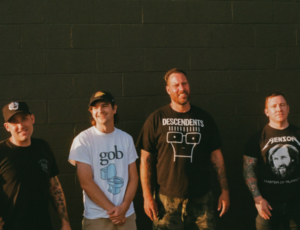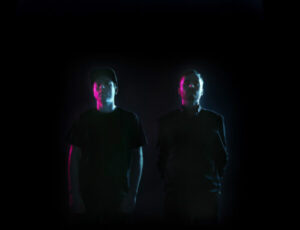
Jon Philpot has a very busy day ahead of him.
Sometime after our interview, Philpot tells me from Brooklyn, he’ll be assembling the component parts of a set of giant LED light poles that his band,
Bear in Heaven, will be taking on their upcoming North American tour. These lights, he explains, will be much more than the typical Technicolor light show that accompanies most onstage performances. Instead, the band members—Philpot, Joe Stickney and Adam Wills– will be effectively playing the lights as they play their instruments, creating a harmonious multi-sensory experience for their audience. That is, once the poles are built.
“Wait,” I interject, “doesn’t your tour start in five days?”
“Yeah,” Philpot admits—I can almost see the shrug, the sheepish grin, despite being a couple thousand miles and three time zones away—“We’re always on the edge of not finishing.” But, he promises, “If it works, it’s going to be incredible.”
Incredible seems to the scale Bear in Heaven operates in these days.
The band’s decidedly different, almost genre-less sound has been reaching wider audiences over the last couple years. This has been helped along in part by well-received performances at certain Texan music festival as well as a growing fan affinity for what is alternately (and unfortunately) referred to as “dream-wave” or “chill-core”. The nebulous and unsettling feelings these names bring to mind are a good introduction to the music itself: expansive and insanely complex, with hints of something weird and ominous.
A quick listen to their latest album,
I Love You, It’s Cool, streamed from the
Bear in Heaven website. It reveals these tendencies. It’s been decelerated to the (yes, incredible) speed of 400,000% slower, so that the entire record plays once during the month before its April 3 release date.
Tune in, if only for a minute: often what you hear is a long, buzzing drone, like a bee that found the Valium flower. It’s also fascinating, as if there’s something to be discovered in the ambient murmur.
Even now I find myself strangely addicted to checking
the site—how does it sound? What’s the hum saying now? Philpot tends to talk about it as if it’s an entirely different record from the one he’s about to release, with a different craft.
“It was made in sort of a passive way, which is sort of beautiful. Ambient music made in an ambient way.”
The record itself, he maintains, is more accessible than its molasses-slow twin. He calls “friendlier” than his previous work, particularly 2010’s
Beast Rest Forth Mouth.
“The last records were like… music, pushing, in your face, you know?”
And this one?
“More like, here’s some music,” he says, and his voice sounds like he’s giving me a flower from across the continent.
And just how friendly is Bear in Heaven, these days?
All signs point to
very. Philpot’s excited for the tour, which starts this week at Philadelphia’s Andy Warhol Museum (“I hope we get a free Warhol painting,” he notes drily) and will bring the trio, with Portland outfit Blouse, to the Biltmore April 14.
We know he’s excited to see us, since he’s picked up on the little things that make our city great.
“There’s always good vibes, the people are usually very pretty and the sushi is amazing.”
After a momentary Vancouver and sushi-oriented love-fest, he starts in again on the great things in store for Bear in Heaven: a European tour (“I want to be like the Rolling Stones over there”), a potential gig in Russia and a true rarity, a little time off between tours to write. Other than that, Philpot’s vision for Bear in Heaven is simple, the proverbial brass tacks of music: “[to] continue making tunes” and more touring, hopefully internationally.
As long as it brings
Bear in Heaven to our good-looking, sushi-laden shores, that sounds all right by me.
The Biltmore show, he promises, will be “a party.” Consider yourself invited.
 Jon Philpot has a very busy day ahead of him.
Sometime after our interview, Philpot tells me from Brooklyn, he’ll be assembling the component parts of a set of giant LED light poles that his band, Bear in Heaven, will be taking on their upcoming North American tour. These lights, he explains, will be much more than the typical Technicolor light show that accompanies most onstage performances. Instead, the band members—Philpot, Joe Stickney and Adam Wills– will be effectively playing the lights as they play their instruments, creating a harmonious multi-sensory experience for their audience. That is, once the poles are built.
“Wait,” I interject, “doesn’t your tour start in five days?”
“Yeah,” Philpot admits—I can almost see the shrug, the sheepish grin, despite being a couple thousand miles and three time zones away—“We’re always on the edge of not finishing.” But, he promises, “If it works, it’s going to be incredible.”
Incredible seems to the scale Bear in Heaven operates in these days.
The band’s decidedly different, almost genre-less sound has been reaching wider audiences over the last couple years. This has been helped along in part by well-received performances at certain Texan music festival as well as a growing fan affinity for what is alternately (and unfortunately) referred to as “dream-wave” or “chill-core”. The nebulous and unsettling feelings these names bring to mind are a good introduction to the music itself: expansive and insanely complex, with hints of something weird and ominous.
A quick listen to their latest album, I Love You, It’s Cool, streamed from the Bear in Heaven website. It reveals these tendencies. It’s been decelerated to the (yes, incredible) speed of 400,000% slower, so that the entire record plays once during the month before its April 3 release date.
Tune in, if only for a minute: often what you hear is a long, buzzing drone, like a bee that found the Valium flower. It’s also fascinating, as if there’s something to be discovered in the ambient murmur.
Even now I find myself strangely addicted to checking the site—how does it sound? What’s the hum saying now? Philpot tends to talk about it as if it’s an entirely different record from the one he’s about to release, with a different craft.
“It was made in sort of a passive way, which is sort of beautiful. Ambient music made in an ambient way.”
The record itself, he maintains, is more accessible than its molasses-slow twin. He calls “friendlier” than his previous work, particularly 2010’s Beast Rest Forth Mouth.
“The last records were like… music, pushing, in your face, you know?”
And this one?
“More like, here’s some music,” he says, and his voice sounds like he’s giving me a flower from across the continent.
And just how friendly is Bear in Heaven, these days?
All signs point to very. Philpot’s excited for the tour, which starts this week at Philadelphia’s Andy Warhol Museum (“I hope we get a free Warhol painting,” he notes drily) and will bring the trio, with Portland outfit Blouse, to the Biltmore April 14.
We know he’s excited to see us, since he’s picked up on the little things that make our city great.
“There’s always good vibes, the people are usually very pretty and the sushi is amazing.”
After a momentary Vancouver and sushi-oriented love-fest, he starts in again on the great things in store for Bear in Heaven: a European tour (“I want to be like the Rolling Stones over there”), a potential gig in Russia and a true rarity, a little time off between tours to write. Other than that, Philpot’s vision for Bear in Heaven is simple, the proverbial brass tacks of music: “[to] continue making tunes” and more touring, hopefully internationally.
As long as it brings Bear in Heaven to our good-looking, sushi-laden shores, that sounds all right by me.
The Biltmore show, he promises, will be “a party.” Consider yourself invited.
Jon Philpot has a very busy day ahead of him.
Sometime after our interview, Philpot tells me from Brooklyn, he’ll be assembling the component parts of a set of giant LED light poles that his band, Bear in Heaven, will be taking on their upcoming North American tour. These lights, he explains, will be much more than the typical Technicolor light show that accompanies most onstage performances. Instead, the band members—Philpot, Joe Stickney and Adam Wills– will be effectively playing the lights as they play their instruments, creating a harmonious multi-sensory experience for their audience. That is, once the poles are built.
“Wait,” I interject, “doesn’t your tour start in five days?”
“Yeah,” Philpot admits—I can almost see the shrug, the sheepish grin, despite being a couple thousand miles and three time zones away—“We’re always on the edge of not finishing.” But, he promises, “If it works, it’s going to be incredible.”
Incredible seems to the scale Bear in Heaven operates in these days.
The band’s decidedly different, almost genre-less sound has been reaching wider audiences over the last couple years. This has been helped along in part by well-received performances at certain Texan music festival as well as a growing fan affinity for what is alternately (and unfortunately) referred to as “dream-wave” or “chill-core”. The nebulous and unsettling feelings these names bring to mind are a good introduction to the music itself: expansive and insanely complex, with hints of something weird and ominous.
A quick listen to their latest album, I Love You, It’s Cool, streamed from the Bear in Heaven website. It reveals these tendencies. It’s been decelerated to the (yes, incredible) speed of 400,000% slower, so that the entire record plays once during the month before its April 3 release date.
Tune in, if only for a minute: often what you hear is a long, buzzing drone, like a bee that found the Valium flower. It’s also fascinating, as if there’s something to be discovered in the ambient murmur.
Even now I find myself strangely addicted to checking the site—how does it sound? What’s the hum saying now? Philpot tends to talk about it as if it’s an entirely different record from the one he’s about to release, with a different craft.
“It was made in sort of a passive way, which is sort of beautiful. Ambient music made in an ambient way.”
The record itself, he maintains, is more accessible than its molasses-slow twin. He calls “friendlier” than his previous work, particularly 2010’s Beast Rest Forth Mouth.
“The last records were like… music, pushing, in your face, you know?”
And this one?
“More like, here’s some music,” he says, and his voice sounds like he’s giving me a flower from across the continent.
And just how friendly is Bear in Heaven, these days?
All signs point to very. Philpot’s excited for the tour, which starts this week at Philadelphia’s Andy Warhol Museum (“I hope we get a free Warhol painting,” he notes drily) and will bring the trio, with Portland outfit Blouse, to the Biltmore April 14.
We know he’s excited to see us, since he’s picked up on the little things that make our city great.
“There’s always good vibes, the people are usually very pretty and the sushi is amazing.”
After a momentary Vancouver and sushi-oriented love-fest, he starts in again on the great things in store for Bear in Heaven: a European tour (“I want to be like the Rolling Stones over there”), a potential gig in Russia and a true rarity, a little time off between tours to write. Other than that, Philpot’s vision for Bear in Heaven is simple, the proverbial brass tacks of music: “[to] continue making tunes” and more touring, hopefully internationally.
As long as it brings Bear in Heaven to our good-looking, sushi-laden shores, that sounds all right by me.
The Biltmore show, he promises, will be “a party.” Consider yourself invited. 









